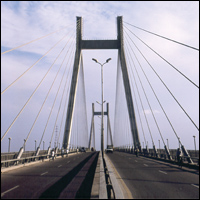Highway developers, though appreciative of the government’s recent decision to permit harmonious substitution of the concessionaire in ongoing and completed national highway projects awarded under Public Private Partnership on Build-Operate-Transfer mode, have sought certain amendments in the related provisions and procedure laid down for the purpose.
The decision pertaining to substitution of the concessionaire was announced by the National Highways Authority of India through a circular dated July 17th, 2013. The Cabinet Committee on Economic Affairs had approved the proposal on June 21st, 2013.
The primary objective behind the decision allowing substitution of the concessionaire is to revive the road sector. Highway developers, however, point out that the objective may be difficult to achieve given the circular issued by NHAI not only lacks clarity but also fails to address various concerns of the sector.
Reviewing the NHAI circular indicates that the decision permitting substitution of the existing concessionaire does not apply to projects that have not achieved financial closure. In case of many projects, the financing agreement is executed but financial closure remains pending due to NHAI’s failure to fulfill the Conditions Precedent. Besides, substitution by a financially strong entity can facilitate achievement of financial closure and rescue a viable project. It is also not clear whether partially completed projects and those with provisional Commercial Operation Date are covered by the decision permitting substitution of the concessionaire.
The requirement for projects that have achieved COD, as per the circular, is that the substituting entity should have adequate experience of operating and maintaining completed road projects by itself or through its associates/ subsidiaries. It may be noted that the substituting entity can always engage an experienced operation and maintenance contractor or hire qualified and trained personnel for operation and maintenance of the project. Such an arrangement is supported by the Request for Qualification document.
In case of projects under construction, the NHAI circular states that the substituting consortium/ entity should have the requisite financial and technical qualifications to bid for a project of at least the same size or higher/ better. There is no mention though about the details of qualification and whether size refers to total project cost.
Under the procedure laid down in the circular for substitution of the concessionaire, the NHAI is allowed to levy a penalty, subject to a maximum of 1 percent of the TPC, on the concessionaire seeking substitution for any default. The nature of default that would attract penalty, however, has not been elaborated upon.
The circular also lacks clarity with regard to several other issues including the requirement that subsequent to substitution, for completed projects, the lead substituting entity maintain at least 51 percent holding in the project special purpose vehicle, the condition that the exiting concessionaire discharge all claims against the NHAI and the right of the lender to substitute the concessionaire in case of default in the context of the stipulation that substitution can be permitted only once during construction period.
The procedure for substitution of the concessionaire stipulates that the nominated company substituting the concessionaire would have to form a new SPV for taking over the project as well as rights and obligations. Highway developers fear such a stipulation could lead to many complications and enhance a project’s risk profile.
With regard to the provision stated in the circular which allows the NHAI to levy a penalty on the outgoing concessionaire in case of any default, highway developers consider it a deterrent to investment.
The National Highways Builders Federation recently wrote to the Prime Minister and Finance Minister seeking more clarity on some of the issues concerning substitution of the concessionaire and also amendment of certain provisions stated in the NHAI circular.











